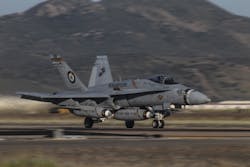Navy asks Boeing to upgrade avionics software on F/A-18C/D combat jets to prevent crashes during maneuvers
PATUXENT RIVER NAS, Md. – U.S. naval aviation experts needed upgrades to the flight-control software in Navy combat aircraft to reduce the risk of pilots crashing into the ground on difficult missions. They found their solution from the Boeing Co.
Officials of the Naval Air Systems Command at Patuxent River Naval Air Station, Md., announced a $12.4 million contract last week to the Boeing Defense, Space & Security segment in St. Louis for the Automatic Ground Collision Avoidance System (Auto-GCAS) Flight Control Computer (FCC) Upgrade.
Navy officials want Boeing to upgrade the avionics and software of the Navy Boeing F/A-18C/D light-attack bomber to enhance the aircraft's ability to prevent controlled flight into terrain when the pilot is fixated on a target during an attack dive; spatially disoriented; loses consciousness; or suffers degraded abilities due to oxygen deprivation.
The F/A-18C/D combat jets have quad-redundant digital fly-by-wire flight-control systems that converts pilot and aircraft inputs to flight control actuator commands from surface actuators, air data sensors, pilot controls, displays, software, and the quad-channel flight control electronic set (FCES) subsystem.
The flight-control system provides overall control of the F/A-18C/D aircraft and controls flight, redundancy management, autopilot, input/output processing, system monitors, and built-in-test.
Boeing experts will upgrade the F/A-18C/D combat jet's ability to translate the pull vector from the digital map computer into flight control movements, provide status to the mission computer, and perform system integrity checks.
The automatic ground collision avoidance system project will upgrade the software in the aircraft's digital map computer, and combine with the plane's existing terrain avoidance warning system to create the automatic terrain avoidance and warning system.
Boeing will update software in the aircraft's mission computer and digital map computer, update its flight control computer, and test the flight control computer. Boeing is the original manufacturer of the F/A-18C/D aircraft. Boeing acquired F/A-18C/D designer McDonnell Douglas Corp. in 1997.
The automatic ground collision avoidance system is to provide a safety backup that automatically recovers the aircraft from an impending crash using digital terrain elevation data as a reference for ground elevation.
The system will compare digital terrain elevation to flight parameters to generate a warning and initiate automatic recovery if the pilot does not take action. The system will generate visual warnings, advisories, and aural alerts to alert the aircrew when necessary.
The upgraded system will enable the pilot to initiate a recovery manually that returns the aircraft to straight-and-level flight.
There are several key challenges that Boeing avionics designers must face. First, while Navy experts will provide source code for the flight control computer program, Boeing will provide the build tools that actually generate the executable program.
Second, the F/A-18C/D aircraft uses the General Electric MCP 701E processor for flight control, which has no significant commercial use outside the F-18C/D application. As a result, Boeing experts must deal with the processor's proprietary build tools.
On this project, Boeing will do the work in St. Louis, and should be finished by June 2024. For more information contact Boeing Defense, Space & Security online at www.boeing.com/company/about-bds, or Naval Air Systems Command at www.navair.navy.mil.
About the Author
John Keller
Editor-in-Chief
John Keller is the Editor-in-Chief, Military & Aerospace Electronics Magazine--provides extensive coverage and analysis of enabling electronics and optoelectronic technologies in military, space and commercial aviation applications. John has been a member of the Military & Aerospace Electronics staff since 1989 and chief editor since 1995.
